Let me preface by saying that I am so grateful to CS-CAN/Info-Can, SFU, WiCS, and the Software Systems Student Society for this opportunity. Since attending this conference, I am even more so looking forward to a future in tech!
An Overview
I was very fortunate to attend the Annual Celebration of Women in Computing Conference (CAN-CWIC 2023), on behalf of Software Systems at Simon Fraser University and alongside SFU Women in Computing Science (WiCS). The experience was not only incredibly beneficial for guiding my future career path but also served as a great way to meet amazing women from other universities and across Canada.
Many of the speakers had inspiring stories to share and made me incredibly hopeful for a continued career in Computing, a field where I have the opportunity to endlessly learn and grow with a wonderful community. It was a pleasure to learn from highly skilled women in technology, as well as to meet with great companies and learn of the multitude of different paths I can take within Computing Science.
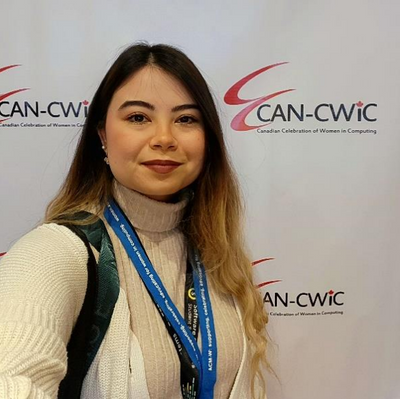
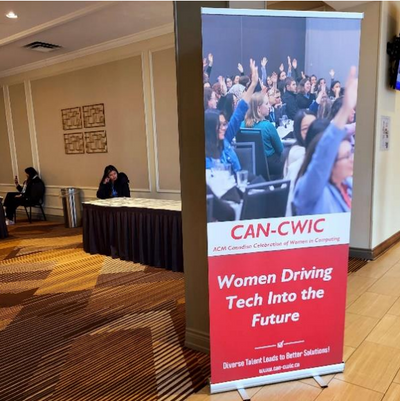
Day 1: October 20, 2023
On Friday evening, the conference began with dinner at 6:30pm. Although registration and badge pickup were scheduled for earlier in the day, I waited to pick mine up just before the dinner and had no issues with the process. We filled our plates with as much food as we wanted and were able to freely enter and exit the banquet hall (international ballroom) as needed. I met some students from the University of Toronto and joined them in the hall. Introductions and the keynote speaker panel were both held in the ballroom while we ate.
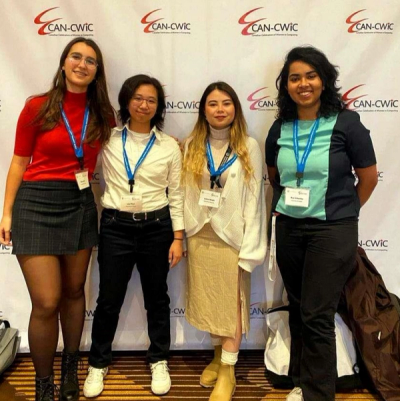
An SFU lecturer, Ouldooz Baghban Karimi, welcomed us all to the conference and led us through the agenda for the weekend. We learned that over 500 university students were in attendance at the conference, and I felt so happy to see how many women were pursuing careers in technology. At school, I have often felt lonely because I was one of the only females in a classroom, but it was relieving to see how much that number is growing throughout STEM fields in Canada.
The keynote speaker was Tanjulia Akter, a Software Engineer at Electronic Arts. She not only shared stories of her amazing journey across different countries, schools, and fields, but also led a very informative Q&A session that encouraged us to take risks, accept opportunities, and not be afraid to reach for goals that seem out of reach. I found it particularly helpful to hear about how many times she was told “no”, but persevered anyways to reach the position she is in now. She was honest, inspiring, and very informative.
I stayed around the conference area until late in the evening, meeting other students from schools across Canada and also meeting with some other SFU students that were attending the conference. We talked about our experiences at our various schools, courses we had taken, co-op opportunities, and our experiences with being in STEM. It was both a fun bonding time and a very informative experience.
Day 2: October 21, 2023
Day 2 began very early, especially given the time difference, which meant that the 7:30am start was equivalent to 4:30am Vancouver time. We had a small breakfast and attended the NCWIT Aspirations in Computing National Award Presentation. There were 4 keynote speakers that each had a different journey to share with us:
1. Victoria Granova, Security Technical Program Manager at Amazon Web Services
2. Nailah Ogeer, Senior IT Manager at TD Bank
3. Christina Fung, Global Head of AI Enablement at CGI
4. Pauline Keeton Curtis, Managing Director Portfolio Technical Support at BMO
At 10am, the first parallel sessions began. I attended the Cybersecurity session led by Anne Marie Salter, Data scientist and Machine learning researcher at CSE-CST: the Canadian Center for Cyber Security – Communications Security Establishment. Anne Marie spoke about cybersecurity in terms of the National Cyber Threat Assessment for 2023-24. Her presentation was very creative and rewarding. We learned about misinformation and ransomware, as well as how dangerous deepfakes can be. In particular, it is alarming to learn that there is really no great way to avoid deepfakes, other than to be aware that they exist. They are hard to spot, but looking for supporting or contradicting sources is a great way to determine their validity. She also led us through a demonstration of the “Gandalf” AI tool. In her Q&A, we learned more about the lifetime of online data, preventative measures for data breaches, and ways that CSE-CST works to inform the general public of safe online practices. Her session influenced me to research more into Cyber Security and to reconnect with CSE-CST later at the career fair.
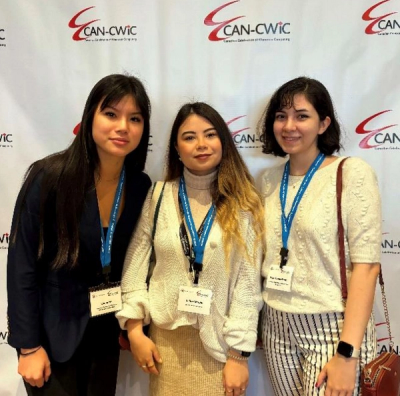
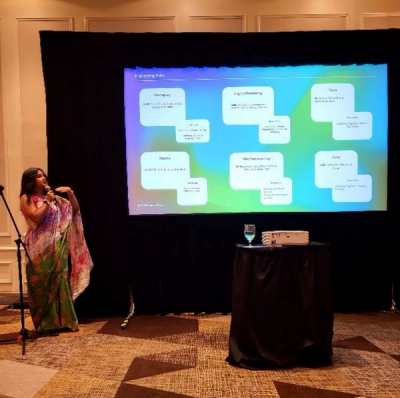
During the next parallel session, I chose to attend Tanjulia Akter’s “Unlocking the Gaming Industry : Your Non-Gaming Experience is the Key” panel at 11am, who also was the keynote speaker on Friday. We learned about the Gaming Industry, its culture, the importance of inclusivity in creating games that represent a wide audience, and the many roles that Software Engineers play in the gaming industry, beyond just producing code. One of the most important takeaways I had was that we should apply for the positions that we want, even if we think that we don’t qualify. We have nothing to lose from applying and can learn a lot from each interview and each new experience. She shared how she applied for a job that she didn’t have enough experience for, but the company found another position for her instead and it led to amazing opportunities.
During the lunch, I reconnected with some students that I had met the previous day and met some new students. At the career fair, I learned about opportunities with many companies, including Electronic Arts, CGI, BMO and TD Banks, Amazon AWS, Google, BlackBerry, FreshBooks, Shared Services Canada, and CSE-CST.
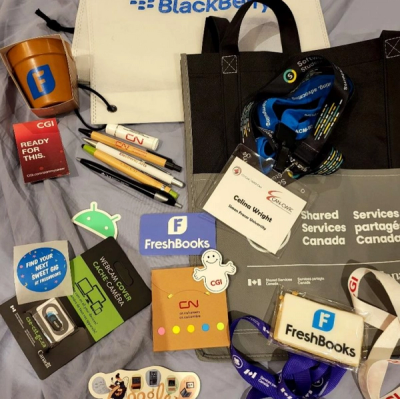
I was able to connect with quite a few women employed at these companies, learn about their experiences, and see some of the available roles they have for both co-op students and graduates. Some of the companies had job pools, so that women at the conference could apply and would be reached out to for any available jobs that meet their interests or expertise.
I attended 2 more sessions throughout the day, including Ouldooz Baghban Karimi’s session about Computer Science Research: Areas, Methodologies, and Resources at 2pm. She shared her research process, from start to finish, and the many resources available to students in STEM. She spoke on research that she has completed and shared upcoming research opportunities at SFU. This included a variety of interests, such as Generative/Interactive AI and data-driven community involved humancentric technology.
At 3pm, I attended a session led by FeiFei Han, an AI Consultant at Deloitte. Her session “Navigating the AI Era: Preparing for the Future” covered many of her projects involving Artificial Intelligence and NLP: National Language Processing, in which models are used to help computers understand about human language.
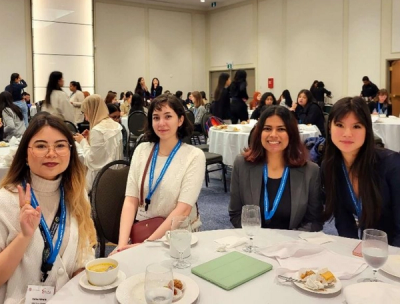
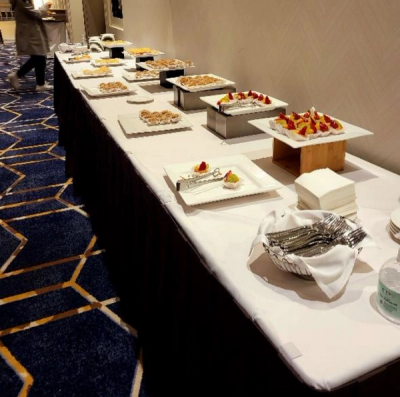
At the end of the day, everyone attended a panel session that included 3 women in various careers, moderated by Joanne Atlee, Professor at University of Waterloo:
- 1. Alicia Greeley, Manager of Cryptographic Services & Operations at Canadian Centre for Cyber Security (CCCS) at the Communications Security Establishment (CSE)
- 2. Sonia Kulwant Singh, Team Product owner and Scrum lead at DevOps Engineer at SAP
- 3. Kelly Lyons, Professor in the Faculty of Information at the University of Toronto and Associate Director of the Schwartz Reisman Institute for Technology and Society
The panel involved discussion about equality and awareness throughout STEM fields and the importance of leadership skills. They each discussed their career journeys and ended the panel with a Q&A.
ADVICE FOR FUTURE ATTENDEES
During the conference, try to talk with as many people as possible. Meet other students, speak with panelists, and don’t be shy in asking questions. Plan ahead with this – look up the program schedule and figure out what you are interested in attending and what you would like to know from professionals in Computing Science or other areas of STEM. Quite a few sessions run in parallel, so make sure you know which ones you would like to attend.
Print up some resumes and bring them with you to the conference during the career fair and speak with as many of the companies as you can. The fair gets very busy very quickly, so although there’s lots of great food, make sure to visit the fair asap. You may want to have some snacks throughout the Saturday because it is a very long day (starting at 7:30) and you will want to make it to the career fair with enough energy. And don’t worry about the lunch, they won’t run out of food. At the career fair, also make sure to get the names and contact information of the people you speak with so that you can connect with them about future opportunities or career advice, particularly on LinkedIn. I asked to take photos of their nametags to speed up the process, which many other attendees did as well.
Some tips beyond the conference:
I took a redeye flight and arrived early in the morning of Friday the 20 th. Although I don’t recommend this early of a flight because the jetlag left me exhausted, this did give me a little extra time to explore Toronto before attending the Conference.
I visited the Royal Ontario Museum and got to explore the city through Toronto’s TTC transit system (which is very easy to use). I also chose to stay at an Airbnb which gave me more freedom for my check-in and check-out times, instead of staying in the Delta Hotel that could be arranged by the conference. I dropped off my luggage at the Airbnb early so that I could travel lighter. Staying with the conference-provided accommodations would definitely be an easier choice and would be better for many attendees, as it is well organized for those that are worried about staying elsewhere in Toronto or are concerned about the additional planning for travel.
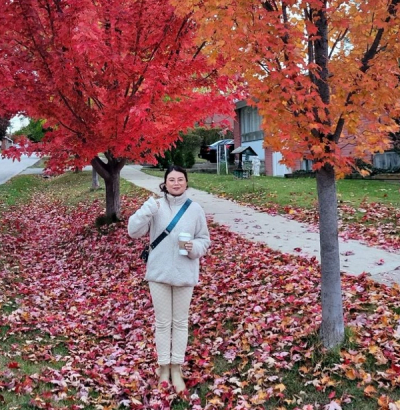
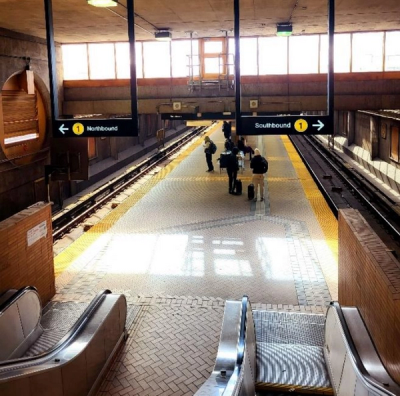
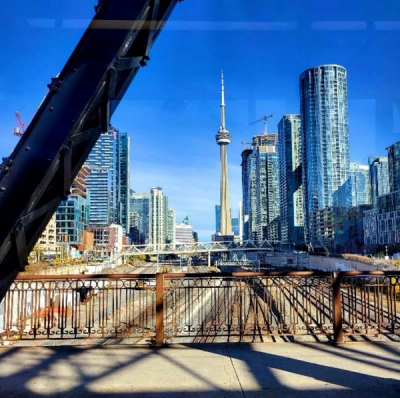
If able, I would recommend taking an extra day! I stayed for Sunday the 22nd as well, after the event had ended. During the event, I spoke with other attendees who attended the University of Toronto and knew the area well, and they recommended places for me to visit throughout the city. I visited Toronto’s Chinatown, Kensington Market, the CN Tower, and Queens Quay. I got to try a lot of great food and I also explored trails in Etobicoke, during my evenings after the conference ended for the day.
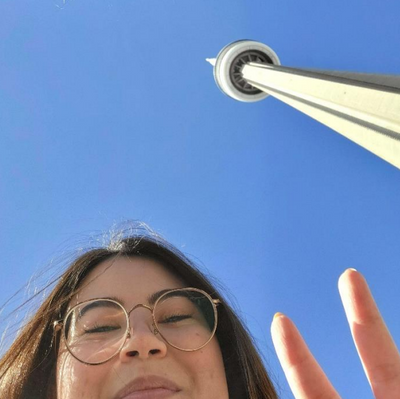
Thanks for reading!